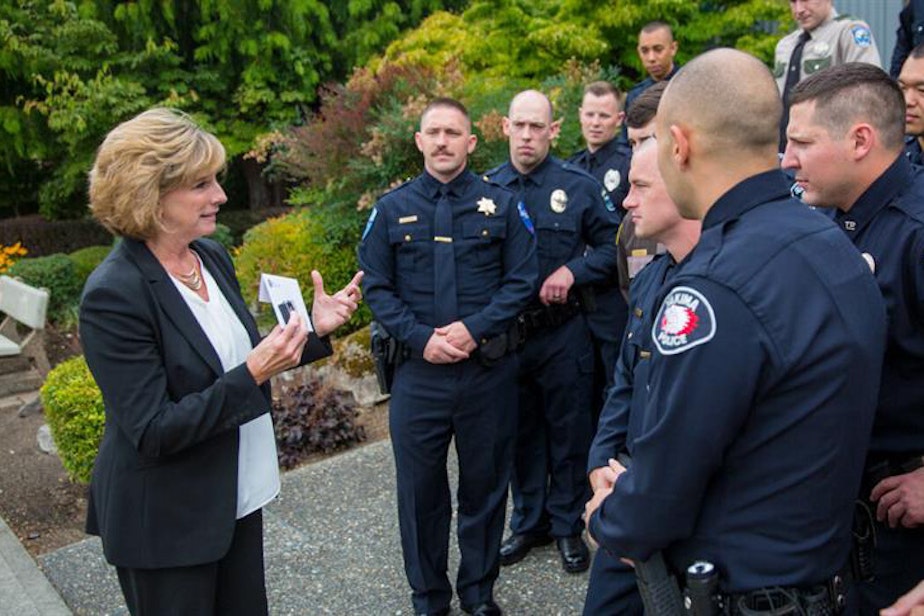What causes a culture of police violence, and what can change it?

Sue Rahr has an experienced vantage point on police culture, the violence that can be embedded within it, and how that culture might change. She's the former King County Sheriff, and more recently led Washington's Criminal Justice Training Commission. She retired a few years ago, after 42 years in law enforcement.
Following the killing of Tyre Nichols by Memphis police, Rahr published a piece for The Atlantic titled "The Myth Propelling America’s Violent Police Culture." KUOW’s Kim Malcolm talked to her about the issue and her article.
This interview has been edited for clarity.
Kim Malcolm: You are making the argument that the reason this keeps happening is because of police culture, which you say is rooted in a tribal mentality built on a false myth of a war between good and evil. Can you explain a little bit more about that idea?
Sue Rahr: Yes. I think like so many professions, there's a whole mythology that has built up over the centuries really about what the role of policing is in our society. The ugly truth is police have been used for more than a century to maintain control and social order, going back to slave patrols, going through the Jim Crow laws, and union busting, it runs the gamut. And not only policing but the criminal justice system itself is designed to maintain order. And unfortunately, that same system is still in place.
People like myself who came into law enforcement in the late 20th century didn't know anything about that history. I wasn't taught about it in college when I got a criminal justice degree, and certainly not in the police academy. What I came to believe and the way I defined myself is, "I'm fighting a noble battle between good and evil, my role is to keep the community safe, and the way I do that is by arresting as many people as I can." When I look back now over four decades and realize the truth of what the system was designed to do and my excitement and zeal to make as many arrests as I could, I realize why this all keeps coming out so wrong, because the premise is false. Just simply arresting lots of people and putting them in jail is not what contributes to community safety.
You and some others have been talking about this idea for some time. Back in 2015, KUOW reported on your efforts to get police recruits to shed the warrior mentality. Why do you think it's so hard for this mindset to be shaken?
Sponsored
Well, the mythology is about fighting a war between good and evil, and so being a warrior is very consistent with that. Also, being a warrior, particularly for young men, that's a wonderful identity to say, "I'm a mighty warrior, I'm strong, and I'm capable." I also think during the 80s and 90s when politically it was very popular to be tough on crime, the warrior mentality fit into that. Post–9/11, when we had all kinds of excess military equipment, the convergence of all these factors came together to really fan the flames of making frontline police officers look like and operate like the military.
You wrote in your essay that you “cringe” when police leaders describe officers like Derek Chauvin as bad apples or rogue cops. You write, "as if their behavior is a surprise; how can anyone be surprised?" What is the most important message you have for police leaders?
We need to provide very robust training and education to police leaders, not only about the history of policing and the system that we're dealing with but also focusing on their responsibility to address problems in behavior and performance very early on. Start with the little things like a minor force case that wasn't good, that needs to be addressed right up front. The typical police culture is, "You don't want to offend, you don't want to rock the boat." We need to double down on encouraging leaders to be very assertive about giving guidance to young officers.
Washington is doing okay, but we need to do a lot more leadership development and leadership training on how to improve accountability, in how to influence the culture, so that we can get rid of this idea that you just go along and get along.
For a younger police officer, maybe at the beginning of their career, or perhaps someone who may just be thinking about it, and they feel the pressure of being pulled by these different schools of thought about what being a police officer is, what would you say to them?
Sponsored
I have to tell you, after the George Floyd murder, we had a graduation at the academy, and I couldn't give my standard graduation speech. What I told the class of recruits is, "This is the best time to go into policing. We are at the front end of a changing era in policing. This is a time where people who really are motivated to make their communities better, to improve safety, we're on the brink of getting better at doing that." I believe that with every fiber of my being. And I know, for the last two years I was at the academy, I was so energized when I would talk to recruits, and I do have a strong bias in favor of millennials, and even the younger generation coming in.
The recruits I talked to at the academy in 2020-21 reminded me of the reaction after 9/11. And these recruits were stepping up saying I want to be part of something that matters, and I want to make this profession better. So, I'm optimistic about the people coming into policing. I want to make sure that our leaders are well prepared to give them the leadership that they need and deserve.
Listen to the interview by clicking the play button above.





